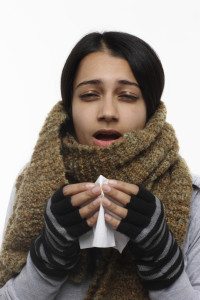 Tip #1: Take Steps to Prevent the Flu
Tip #1: Take Steps to Prevent the Flu
The single best way to prevent seasonal flu is to get vaccinated each year, but good health habits like covering your cough and washing your hands often can help stop the spread of germs and prevent respiratory illnesses like the flu. There also are flu antiviral drugs that can be used to treat and prevent flu. Here are some other useful and healthy practices:
1. Avoid close contact.
Avoid close contact with people who are sick. When you are sick, keep your distance from others to protect them from getting sick too.
2. Stay home when you are sick.
If possible, stay home from work, school, and errands when you are sick. This will help prevent spreading your illness to others.
3. Cover your mouth and nose.
Cover your mouth and nose with a tissue when coughing or sneezing. It may prevent those around you from getting sick.
4. Clean your hands.
Washing your hands often will help protect you from germs. If soap and water are not available, use an alcohol-based hand rub.
5. Avoid touching your eyes, nose or mouth.
Germs are often spread when a person touches something contaminated with germs and then touches his or her eyes, nose, or mouth.
6. Practice other good health habits.
Clean and disinfect frequently touched surfaces at home, work or school, especially when someone is ill. Get plenty of sleep, be physically active, manage your stress, drink plenty of fluids, and eat nutritious food.
Tip #2: Learn to identify the flu
The presence of some or all of these symptoms may indicate the presence of the flu.
- fever*
- cough
- sore throat
- runny or stuffy nose
- body aches
- headache
- chills
- fatigue
- sometimes diarrhea and vomiting
*It's important to note that not everyone with flu will have a fever.
Tip #3: Know what to do if you get sick
Most people with the flu have mild illness and do not need medical care or antiviral drugs. If you get sick with flu symptoms, in most cases, you should stay home and avoid contact with other people except to get medical care.
If, however, you have symptoms of flu and are in a high risk group, or are very sick or worried about your illness, contact your health care provider (doctor, physician’s assistant, etc.).
Certain people are at high risk of serious flu-related complications (including young children, people 65 and older, pregnant women and people with certain medical conditions including asthma, diabetes, heart disease, chronic lung disease, liver or kidney disorders, cancer or people with a weakened immune system ) and this is true both for seasonal flu and novel flu virus infections. (For a full list of people at high risk of flu-related complications, see People at High Risk of Developing Flu–Related Complications. If you are in a high risk group and develop flu symptoms, it’s best for you to contact your doctor. Remind them about your high risk status for flu.
Health care providers will determine whether influenza testing and treatment are needed. Your doctor may prescribe antiviral drugs to treat the flu. These drugs work better for treatment the sooner they are started.
Tip #4: Know when to Seek Emergency Care
Emergency warning signs of flu sickness
 In children
In children
- Fast breathing or trouble breathing
- Bluish skin color
- Not drinking enough fluids
- Not waking up or not interacting
- Being so irritable the child does not want to be held
- Flu-like symptoms improve but then return with fever and worse cough
- Fever with a rash
In addition to the signs above, get medical help right away for any infant who has any of these signs:
- Being unable to eat
- Has no tears when crying
- Significantly fewer wet diapers than normal
In adults
- Difficulty breathing or shortness of breath
- Pain or pressure in the chest or abdomen
- Sudden dizziness
- Confusion
- Severe or persistent vomiting
- Flu-like symptoms that improve but then return with fever or worse cough
Tip #5: Use Available Resources to Educate Yourself and Your Loved Ones
The following resources and links provide more detailed information about the flu.
- What should I do if I get sick?
- Flu Symptoms and Diagnosis
- Flu Symptoms & Complications
- What is the difference between a cold and the flu?
- What is seasonal influenza (flu)?
- VIDEO: Do your part to stop the spread of flu at home
- Cleaning to Prevent Flu (PDF)
Information for Specific Groups
- People at High Risk
- People With Asthma
- People With Diabetes
- People 65 and Older
- Travelers
- Health Care Workers
- Pregnant Women
- Parents & Children
- Schools & Childcare Providers
- Businesses & Employers
- Long-term Care Facilities
Source: CDC
Contact us at 800.383.1908 for more information on our Nurseline resource.


